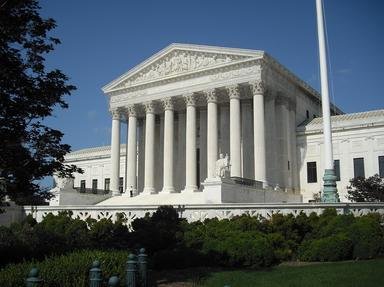Quiz Answer Key and Fun Facts
1. Anthony Kennedy was born and raised in which state, where his parents were influential in state politics and where he met the governor, Earl Warren, a future Chief Justice of the U.S. Supreme Court?
2. What kind of experience did Anthony Kennedy have in the federal judiciary before being nominated to the Supreme Court?
3. Kennedy was nominated by President Ronald Reagan to replace Lewis Powell. Kennedy was not, however, Reagan's first choice for the seat. Which man, whom the Senate rejected, was the original replacement for Powell?
4. From his first term on the Supreme Court, Kennedy was often considered to be a swing vote. This position in the middle of the Court became even more prominent since which justice retired in 2006?
5. When the Supreme Court was not in session, Kennedy sometimes taught a course on American law in which European nation?
6. Kennedy wrote a concurring and dissenting opinion in County of Allegheny v. American Civil Liberties Union, which dealt with the constitutionality of a public display on government grounds of a nativity scene and a menorah. How did Kennedy rule on this issue?
7. Justice Kennedy wrote the majority opinion in which controversial 2010 case that dealt with campaign spending and advertising?
8. Several sources, including "The Washington Post," have stated that Justice Kennedy hated being referred to as the swing vote.
9. Justice Kennedy has a mixed record on the death penalty, sometimes voting to uphold it use and sometimes striking it down. In which of the following circumstances or uses did Kennedy rule that the death penalty is constitutional?
10. Justice Kennedy sometimes considered to be icon in the gay rights community because, unlike other conservative judges, Kennedy has frequently sided with liberals on gay rights issues, authors the majority opinions, and often provided the necessary fifth vote in those cases. But in which of the following gay rights cases did Kennedy wind up in the minority?
Source: Author
Joepetz
This quiz was reviewed by FunTrivia editor
trident before going online.
Any errors found in FunTrivia content are routinely corrected through our feedback system.

